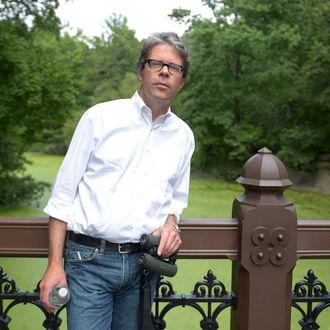
The Guardian has published a lengthy excerpt from Jonathan FranzenÔÇÖs upcoming book, The Kraus Project: Essays by Karl Kraus, that uses KrausÔÇÖs writing about┬áfin-de-si├¿cle Vienna as a lens for examining ÔÇ£our own media-saturated, technology-crazed, apocalypse-haunted historical moment,ÔÇØ which, the Freedom author writes, is plagued by problems such as Jeff BezosÔÇÖs ever-expanding empire, the Twitter account of Salman Rushdie (who ÔÇ£ought to have known betterÔÇØ), and people who believe they can ÔÇ£achieve coolnessÔÇØ simply by owning MacBook Airs. Because the piece seems designed to attract Internet hate-reads, weÔÇÖve gone ahead and picked out some of the more obvious bits of trolling below.
Franzen is a PC. He repeatedly argues that sleek, shiny Apple products somehow impede oneÔÇÖs ability to think as well as he does while typing away on his ÔÇ£new Lenovo ultrabook,ÔÇØ though even he admits that the machine has its flaws: ÔÇ£Working on something called an IdeaPad tempts me to refuse to have ideas.ÔÇØ ÔÇ£As Kraus says of Germanic life, the PC ÔÇÿsobersÔÇÖ what youÔÇÖre doing; it allows you to see it unadorned. This was especially true in the years of DOS operating systems and early┬áWindows,ÔÇØ he writes. Franzen believes that AppleÔÇÖs old ads featuring cool Justin Long (as a Mac) and dorky John Hodgman (as a PC) support this claim. ÔÇ£You wouldnÔÇÖt want to read a novel about the Mac: what would there be to say except that everything is groovy? Characters in novels need to have actual desires; and the character in the Apple ads who had desires was the PC, played by John Hodgman,ÔÇØ he writes. ÔÇ£His attempts to defend himself and to pass himself off as cool were funny, and he suffered, like a human being.ÔÇØ Long, on the other hand, is a figure of ÔÇ£insufferable smugness.ÔÇØ
Franzen doesnÔÇÖt like that people can now Google things instead of just remembering everything. ÔÇ£ItÔÇÖs hard to get through a meal with friends without somebody reaching for an iPhone to retrieve the kind of fact it used to be the brainÔÇÖs responsibility to┬áremember,ÔÇØ he writes. ÔÇ£The techno-boosters, of┬ácourse, see nothing wrong here. They point out that human beings have┬áalways outsourced memory ÔÇô to poets, historians, spouses, books. But IÔÇÖm enough of a child of the 60s to see a difference between letting your spouse remember your niecesÔÇÖ birthdays and handing over basic memory function to a global corporate system of control.ÔÇØ Franzen does not tell us what people who married people with bad memories used to do about their niecesÔÇÖ birthdays before the Internet.
Franzen really doesnÔÇÖt like Twitter, or anything that seems like Twitter to him. In addition to recalling his disappointment at seeing fellow serious writer Rushdie ÔÇ£succumbingÔÇØ to social media, Franzen complains that people called him a Luddite when he called Twitter ÔÇ£dumbÔÇØ in a public forum. He also rallies against the financial pressure Amazon is putting on smaller publishers and booksellers (not to mention its workers) ÔÇö a legitimate concern! ÔÇö though his take on the issue sure doesnÔÇÖt sound like that of someone standing up for the little guy: ÔÇ£Amazon wants a┬áworld in which books are either self-published or published by Amazon itself, with readers dependent on Amazon reviews in choosing books, and with authors responsible for their own promotion. The work of yakkers and tweeters and braggers, and of people with the money to pay somebody to churn out hundreds of five-star reviews for them, will flourish in that world. But what happens to the people who became writers because yakking and tweeting and bragging felt to them like intolerably shallow forms of social engagement? What happens to the people who want to communicate in depth, individual to individual, in the quiet and permanence of the printed word, and who were shaped by their love of writers who wrote when publication still assured some kind of quality control and literary reputations were more than a matter of self-promotional decibel levels?ÔÇØ Franzen does not tell us where getting a 6,500-word excerpt of your book published in a major newspaper ranks on the self-promotion scale.
To be fair, the piece ends on a somewhat self-reflective note, with Franzen admits that a world where ÔÇ£half the advertisements on network television are featuring people bending over smartphonesÔÇØ may not actually be on on the verge of apocalypse, even those Bezos ÔÇ£surely looks like one of the four horsemen.ÔÇØ He writes, ÔÇ£Maybe apocalypse is, paradoxically, always individual, always personal. I have a brief tenure on Earth, bracketed by infinities of nothingness, and during the first part of this tenure I┬áform an attachment to a┬áparticular set┬áof human values that are shaped inevitably by my social circumstances.ÔÇØ Franzen explains that the world into which he was born in 1959 ÔÇö when people watched television ÔÇ£only during prime timeÔÇØ and sent letters, when ÔÇ£New┬áCriticism reigned in English departmentsÔÇØ ÔÇö ÔÇ£wasnÔÇÖt necessarily a better world ÔǪ but it was the only world I knew to try to find my place in┬áas a writer.ÔÇØ Of course, as one of todayÔÇÖs most highly regarded novelists, Franzen has a very solid place in the world of 2013 ÔÇö and there are better uses for it than coming down on everybody else for liking their computers.

